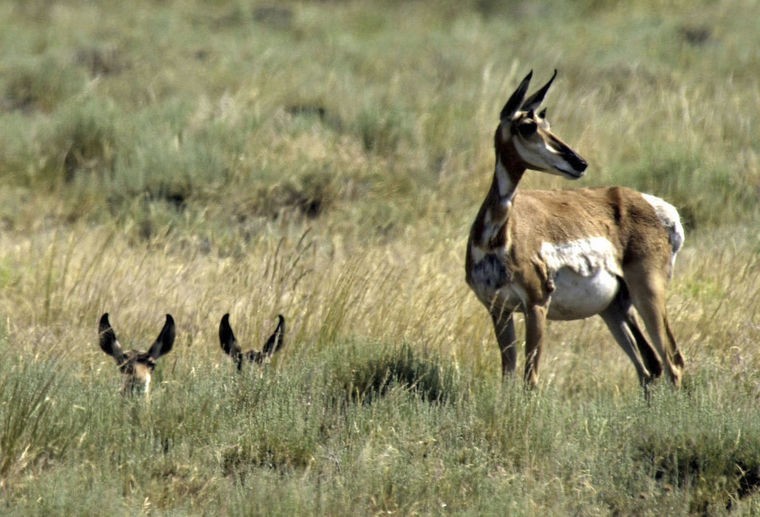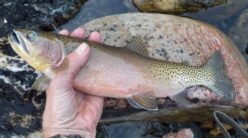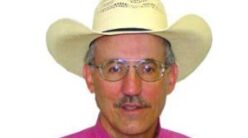A change in U.S. House rules making it easier to transfer millions of acres of federal public lands to states is worrying hunters and other outdoor enthusiasts across the West who fear losing access.
Martin Hackworth, executive director of Sharetrails.org/BlueRibbon Coalition, which supports responsible use of public lands and waters for all recreationists, believes transferring such properties to states would be a terrible mistake.
“I may really disagree with the way federal lands are managed, (but as long as they are under) federal control, they still belong to everybody in the U.S.,” he said, adding that if they are transferred to states, that will no longer be true.
Lawmakers recently passed a rule eliminating a significant budget hurdle and written so broadly that it includes national parks.
President Donald Trump’s pick for Interior secretary, Montana Rep. Ryan Zinke, voted for the rule change as did many other Republicans. The Senate would have to weigh in on public land transfers as well.
The rule passed by the House defines federal land that could be given to states as “any land owned by the United States, including the surface estate, the subsurface estate, or any improvements thereon.”
About a million square miles of public land is managed by the federal government, mostly in 12 Western states, according to the Congressional Research Service. Some state lawmakers in recent years have made failed efforts to wrest control of those lands, mainly to reduce obstacles to accessing resources such as timber, natural gas and oil, said Boise State University professor and public lands policy expert John Freemuth.
U.S. lawmakers have the authority to transfer those lands to states. But Outdoor recreationists fear states would then sell the land to private entities that would end public access.
“Anybody who uses them for any kind of outdoor activity — snowmobiling, mountain biking, hunters, all that — they’re very alarmed by all this,” Freemuth said. “The loss of access that this could lead to.”
In Idaho, a variety of outdoor enthusiasts are planning a rally on the south steps of the Idaho Capitol at 11 a.m. March 4 to show their support for keeping public lands public.
“We want to see hunters and hikers; climbers and bird-watchers; mountain bikers and OHV owners. We want to see everybody who spends time in the outdoors,” Rob Thornberry, Idaho representative for the Theodore Roosevelt Conservation Partnership, said in a news release. “Idaho’s public lands are a treasure, and we want show our support for them.”
Thornberry hopes the rally will dissuade state lawmakers from pursuing any public lands in the future.
But others want states to take over federal lands.
Lawmakers in Utah have backed a resolution urging the state to be prepared to sue the U.S. government if Washington leaders don’t start handing over federal land to the state.
Members of a House natural resources committee on Friday approved the proposal, despite concern from one lawmaker that it could be costly and hurt the environment.
The proposal previously included stricter language, stipulating that if Congress or the White House do not make major moves to hand over control of public lands by December, then the state should appeal to the U.S. Supreme Court.
Changes to the now-softened proposal included removing the December deadline.
The sponsor, Orem Republican Rep. Keven Stratton, says he made changes because he thinks the Republican-controlled Congress and White House may be willing to hand over the land to Utah.
But Hackworth doesn’t think states, which already struggle to fund schools, prisons and other infrastructure, could afford to maintain the properties or deal with the frequent legal challenges that come with them.
“A well-funded lawsuit could put a state out of business,” Hackworth said, adding that states could be forced to settle cases under unfavorable terms or even sell transferred lands, which could cut off public access entirely.
Doug Sayer, chief business officer of Premier Technology Inc. in Blackfoot, agrees that states can’t afford to maintain such lands. The cost of fighting a couple of wildfires during a dry year will prove it, he said.
He also feels that there is a real risk that the lands could eventually be sold.
“Access could be lost, and there are many of us who would lose the opportunity to enjoy these wild places,” Sayer said.
He believes it would be better for the federal government and its agencies to work closer with states. Modifying current management plans could mitigate some of the reasons people want the transfers to take place, he said.
“There needs to be a balance in this land mosaic, access can also be lost when federal lands are turned into national monuments,” Sayer said.
Whit Fosburgh, CEO of the Theodore Roosevelt Conservation Partnership, which works to guarantee places to hunt and fish, was irked that the House approved a rule that he said essentially allows federal public land to be given away as if it had no value.
Still, he’s inclined to excuse Zinke on his House vote favoring transfers because of his record being “very solid on these public lands issues.”
Zinke has a track record of opposing public land transfers. Last summer, he resigned as a delegate to the Republican National Convention, which favors such transfers.
“The congressman has never voted to sell or transfer federal lands and he maintains his position against the sale or transfer of federal lands,” Heather Swift, a Zinke spokeswoman, said in an email.
Rep. Mike Simpson, R-Idaho, also voted for the rule easing transfers. But Simpson was also the driver of a 2015 bill that created three wilderness areas in Idaho after he got ranchers, recreationists and environmental groups to back the plan after a 15-year effort.
The possibility that former president Barack Obama would designate a much larger area as a national monument is widely believed to have led to the bill passed by the House and Senate.
“There is no disputing Congressman Simpson is a supporter of public lands,” Nikki Wallace, a spokeswoman for Simpson, wrote in an email.
Still, she pointed out that many rural communities are surrounded by or interface with federal lands, and there are times when small land transfers would make sense. For instance, if a rural town needs a small piece of BLM land near a highway to develop a school bus turnaround, she writes that non-controversial legislation should be able to accomplish that.
Wallace notes that Congress would still have the ability to look at the intent of land proposals and consider the impacts to public lands.
Rep. Raúl Labrador, R-Idaho, also supported the change in House rules.
Freemuth says that even with a rule change, land transfers would face significant challenges.
“Whatever Zinke says early will affect those attempts,” Freemuth said.



